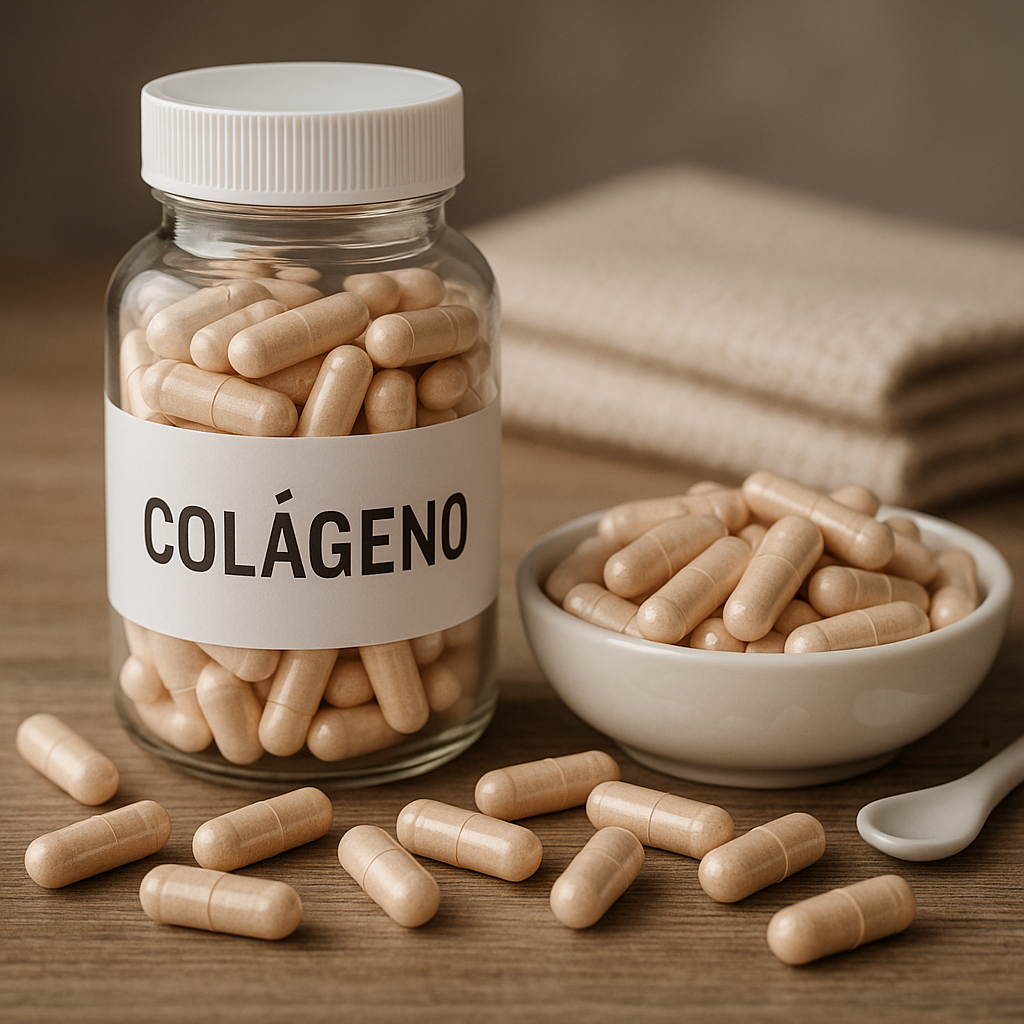Collagen is one of the most abundant proteins in the human body and one of the most popular ingredients when it comes to supplements for health, beauty, and longevity. Naturally produced by the body, collagen is essential for maintaining firm skin, healthy joints, and the integrity of tissues such as bones, tendons, and ligaments.
In this article, you’ll learn what collagen is, how it works in the body, the benefits of supplementation, the different types available, and how to maximize its effects in your daily routine.
What Is Collagen?
Collagen is a structural protein made up of amino acids, especially glycine, proline, and hydroxyproline. It forms strong, elastic fibers that provide support, firmness, and elasticity to the body’s tissues.
Although naturally produced, collagen levels decline significantly over time—starting around age 25, we lose about 1% per year, and this decrease accelerates after age 40.
What Is Collagen For?
Collagen is found throughout the body and is essential for:
- Skin – firmness, elasticity, hydration, and regeneration
- Cartilage – cushioning between bones, joint pain prevention
- Tendons and Ligaments – strength and mechanical resistance
- Muscles – structural support
- Bones and Teeth – stability and integrity
- Nails and Hair – strength and healthy growth
Benefits of Collagen Supplementation
1. Improved Skin Health
Numerous studies show that hydrolyzed collagen supplementation can:
- Reduce wrinkles and fine lines
- Increase skin elasticity
- Improve skin hydration
- Stimulate natural collagen production
2. Joint Support
Type II collagen, in particular, is effective for maintaining joint cartilage, reducing pain and mild inflammation—especially in people with physical wear or advanced age.
3. Muscle Mass Support
By supporting muscle structure, collagen helps maintain strength and physical performance, especially when combined with protein and exercise.
4. Stronger Hair and Nails
Many users report improved growth and strength of nails and hair after a few months of consistent use.
5. Bone Health
Collagen is part of the bone matrix and can reduce the risk of fractures when combined with calcium and vitamin D, especially in postmenopausal women.
Types of Collagen and Their Functions
- Type I – most abundant, found in skin, tendons, and bones
- Type II – cartilage and joints
- Type III – blood vessels and internal organs
- Types V and X – less common, found in hair, placenta, and developing cartilage
Most supplements focus on types I and II, especially in hydrolyzed form (more absorbable).
What Is Hydrolyzed Collagen?
Hydrolyzed collagen is collagen that has been broken down into smaller peptides for easier absorption in the gut. It is the most effective and bioavailable form for oral supplementation.
Recommended Dosage
The ideal dose may vary, but studies suggest:
- 2.5g to 10g per day of hydrolyzed collagen for skin and joint benefits
- Daily use for at least 8 to 12 weeks to see noticeable results
Best Times and Ways to Take It
- Can be taken on an empty stomach, with juice, water, or in shakes
- Can also be added to recipes (it does not denature easily)
- Consistency is key — supplementation must be daily
Nutrient Synergy
To be truly effective, collagen needs cofactors that stimulate its synthesis in the body:
- Vitamin C – essential for collagen production
- Silicon – helps tissue regeneration
- Zinc and Copper – support collagen fiber formation
- Hyaluronic Acid – supports skin hydration and plumpness
- Biotin – strengthens hair and nails
The best collagen supplements are already enriched with these nutrients.
Does Collagen Cause Weight Gain?
No. Collagen is a low-calorie protein and does not cause weight gain. In fact, it may help with satiety when combined with a balanced diet.
Contraindications
- People with allergies to bovine or marine protein should choose an appropriate source
- Pregnant and breastfeeding women should consult a healthcare provider
- Collagen is not a substitute for a healthy diet, but rather a complement
Final Thoughts
Collagen is much more than a beauty supplement—it is a structural foundation of the human body. Maintaining healthy levels of this protein means caring for your skin, joints, bones, and more.
In the right form and with the proper nutrients, collagen can be one of the most complete supplements for those seeking long-term health, beauty, and vitality.
